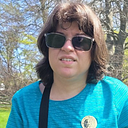Thoughts on Disability and The Little Mermaid, Many Years Later
I have cerebral palsy and obsessive-compulsive disorder, and certain ideas have obsessed me for my entire life. I’ll probably never stop writing about them from different angles. The uncanny, especially Sigmund Freud’s interpretation of it, was an idea that retrospectively explained my experiences of ableism and of trying to make sense of the world, going back to my childhood.
https://www.instagram.com/p/CSotOQCr4aE/
ID: movie still of Ariel from Disney’s The Little Mermaid
Hans Christian Andersen’s fairy tale “The Little Mermaid,” particularly Disney’s 1989 movie version, was an even more formative text for me. I mentioned relating the mermaid’s tail and desire for legs to my own mobility disability in my story “Categories.” I wrote it in Jared Green’s college creative writing class when I was 19, and Deaf Poets Society published it in 2017. The story ends with the line: “I wished she [Ariel] had stayed in the sea and been happy with her tail.”
Then, in 2018, Monstering’s blog published my creative nonfiction essay “Ambulatory: How The Little Mermaid Shaped My Self-Image With Cerebral Palsy,” where I expanded on my childhood fascination with Disney’s Ariel. Amanda Leduc interviewed me and cited my essay in her 2020 nonfiction book Disfigured: On Fairy Tales, Disability, and Making Space. I’m glad so many people read my ideas on fairy tales and find them influential.
Looking back, though, I’m afraid I was trying to do too much in my 2018 essay. I wrote: “ ‘She has feet!’ “ I told my babysitter, thinking hazily of my own goal of one day walking independently.” I think I moved on from this idea much too quickly in the essay, so I want to analyze it now. I covered the song “Part of Your World” on my YouTube channel in 2020 — clearly a lifelong fascination.
As a toddler, long before I could articulate this, I unconsciously related to “Part of Your World” because Ariel’s mermaid society doesn’t consider walking normative. Ariel sings:
“I wanna be where the people are
I wanna see, wanna see them dancin’
Walking around on those — what do you call ‘em? Oh — feet!
Flippin’ your fins, you don’t get too far
Legs are required for jumping, dancing
Strolling along down a — what’s that word again? Street!”
Ariel struggles to remember that most humans walk and the vocabulary associated with it — feet, street, etc. As I child, I found this delightful. Mer-people don’t walk, of course, and so Ariel considers walking exotic and fascinating. Long before I knew words like metaphor or irony, I knew I lived in a world where the opposite was true: it was considered “normal” to walk. As an adult, I realize I had absorbed, or been interpellated into, the idea that most people walked, while Ariel had not. Non-disabled people seemed to know how to walk effortlessly, while I’ve always had to dedicate a lot of concentration and energy to it.
This reversal of norms resonated with me — even more than Ariel’s desire to walk. I wrote on Monstering and elsewhere that my family, friends, and I have never considered me “inferior” or “abnormal” in any way. These are both inherently ableist constructs, hence the scare quotes. Long before I realized that “normal” was an arbitrary, oppressive concept, I laughed at the idea of a fantasy world where humans who walked were The Other, and beings who didn’t were the norm.
I also wrote in Monstering that a dearth of representation led children like me to reach for metaphors, no matter how surprising or far-fetched they may seem. I knew I had feet and legs, but I walked much later than average, so it’s an imaginative parallel, not an exact one. Many metaphors work best on emotional, unconscious, or subconscious levels.
Ariel’s confusion over the human world amused and thrilled me, even though I didn’t relate to her desire to change a fundamental part of herself. Yes, Ariel wants to emulate humans and give up her life as a mermaid to become one. Still, I laughed, imagining a world where it wasn’t considered “normal” to walk, and even the vocabulary and mechanics of walking were not taken for granted.
In the final song, “Happy Ending,” a full chorus echoes Ariel’s earlier yearning from “Part of Your World”:
“Now we can walk; now we can run . . .”
No wonder I subconsciously related this movie to my goals of walking. To me, it seemed like Ariel had achieved her goal. As I wrote on Monstering, I eventually accepted the security that mobility devices offered me and that it wasn’t a realistic or desirable goal for me to walk without them.
(Songwriters: Alan Menken & Howard Elliott Ashman
lyrics © 1989 Walt Disney Music Company)
